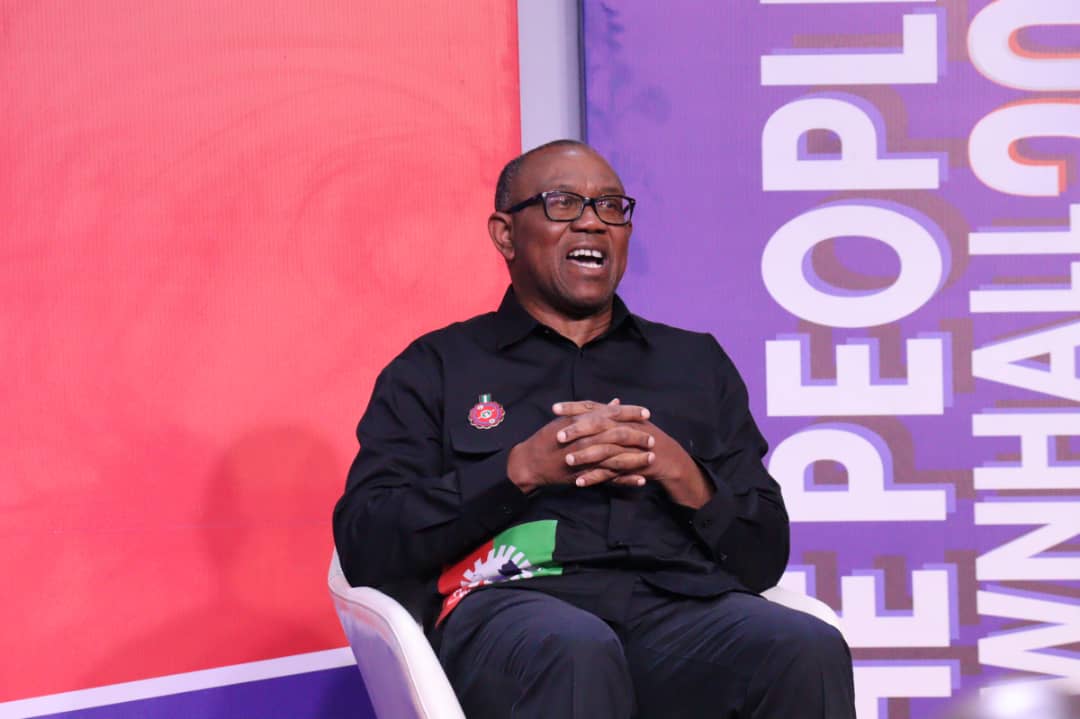Labour Party Presidential candidate, Mr. Peter Obi, has said he would if elected, quickly remove fuel subsidy and invest the funds in critical development sectors like education, health and infrastructure.
Mr. Obi made the promise on Sunday at a Presidential Townhall Series organised by Channels Television titled ‘The People’s Townhall’
Join our WhatsApp ChannelMr. Obi and his Vice Presidential candidate, Senator Yusuf Datti Baba-Ahmed, participated in the Presidential Townhall series which Seeks to help Nigerians understand what each of the candidates has to offer if elected into office in February 2023.
Obi, who was responding to a question on whether he will remove fuel subsidy within 100 days in office, said he would do it immediately he enters office.
He said: “I can assure you it would go immediately if I am elected President. Fuel subsidy, as I have said before, is an organised crime and I cannot allow it to stay a day longer.”
He said Nigeria spends more money on subsidy than on other critical sectors which is not suppose to be.
Fuel Subsidy scheme has been a raging issue due to heavy fund injected into it annually since it came into place.
In 2022, the country allocated N4 trillion for subsidy and has made provisions of N3.36 trillion naira to cover subsidy payment for the first six months of 2023 when it will end.
Obi said the amount being mentioned as the cost is not suppose to be because a country like Pakistan which has the same population with Nigeria consumes 50 per cent of what is being consumed in Nigeria.
He said the money will be saved for investment in regenerative ventures.
“We need the money to be able to invest in critical social development issues.
“Going by the figures, half year (2023) is N3.6 trillion, so, if it is full year is about N7 trillion for subsidy. Which country will invest more in subsidy than Education, Health, and even roads. It doesn’t makes sense,” Obi stated.
Speaking on fixing power problem in the country, the LP presidential candidate said resolving the challenge in the sector is not intractable, but people managing it have not been doing the right.
“The issue with power sector is that people there are not doing the right. We are not the only country that has power problem; people have solved it everywhere. This is not a rocket science. It’s been done in several countries of the world, so, why is our own different.”
He further said that he would not cancel the current privatization structure in the power sector but devise a means to make it work.
He said there is need to unbundle the transmission subsector to increase capacity and also support the generation and distribution companies to increase power capacity and solve other development challenges in the country.
“What we need to do in power sector is to first unbundle the transmission line. Today, we’re generating almost 10 megawatts but the transmission line cannot carry that. We are also going to support the DisCos and the GenCos to make sure that whatever is produced, is distributed accordingly.”
He said this must be carried out strictly under a guideline properly supervised, adding that since other countries in Africa like South Africa, Egypt, among others could do it, Nigeria can also do so.
He added that when elected, his government would strive to generate more than 20,000 megawatts within the first four years.
On activities in the Nigerian ports, Obi said there will be a revolution to ensure that the sector contributes optimally yo the country’s economy.
Part of the overhaul, he said, will involve developing more ports to serve the nation’s export and import needs.
“We are going to dismantle the confusion in Ports Administration and get this country to work.
“Nigeria is the only ports authority that has its office outside the country. God bless you for continuing to expose the thieves keeping us down,” Obi stated.
On the foreign exchange crisis causing the Naira to depreciate more and more in value, the former Anambra State governor said there was now way the value of the currency will appreciate better without increasing the country’s production capacity to boost exports which adds value to the foreign reserve.
“You and I know that the only thing that drives exchange rate is your reserve, and your reserve is as a function of your exports when you are not producing anything and you are not exporting anything, there is no way you can control that; you just have to move into production,” Obi added.
He said that oil production which has been the main source of foreign exchange earning for the country was being sabotaged through theft.
“Oil which ordinarily would be the main source of foreign exchange income is now being stolen. We are the only OPEC country apart from Venezuela, that could not meet the quota because people in government are stealing the oil. So, it is a mess, we need to deal with all these.”
Global oil prices went up in 2022 due to the Russia-Ukraine war. Nigeria could not meet the OPEC quota because of theft in the oil producing areas leading to decline in production.
Obi cited Angola as an example of a country that was able to bring down its inflation and stabilise exchange rate because it produced optimally and was able to gain more from high oil prices.
He also blamed the government for what he called “financial rascality” by investing money in unproductive ventures, which causes inflation, as money supply far surpases what is being produced.
“The level of money supply is about four times the productive supply. The GDP grew in the last quarter of 2022 by 2.25 per cent but the money supply grew by 11 per cent. That means you’re throwing more money in an unproductive sector. So it is about a production.”
He said there is a need to merge the two exchange rate system existing in Nigeria, which he called “criminal rate of exchange.”
On his part, the Vice Presidential candidate, Senator Datti, similarly, blamed the sharp rise of the exchange rate within the last seven years to excess cash injected into the financial system.
He also claimed that there are some people who manipulate the exchange rate for their personal gain and that has put the country in financial quagmire.
“We have suffered the consequences of some people’s burning desire to get rich quickly, and the easiest way for them was manipulation of the exchange rate.”
He also alluded to what Mr. Obi said that merging the two rate system will be the best option.
For improving education and health care in the country, Mr. Obi said if elected, he would ensure that the two sectors will not receive anything less than 10 per cent in any budget under his government. “Education and health will be properly funded.”
Victor Ezeja is a passionate journalist with seven years of experience writing on economy, politics and energy. He holds a Master's degree in Mass Communication.



















Follow Us